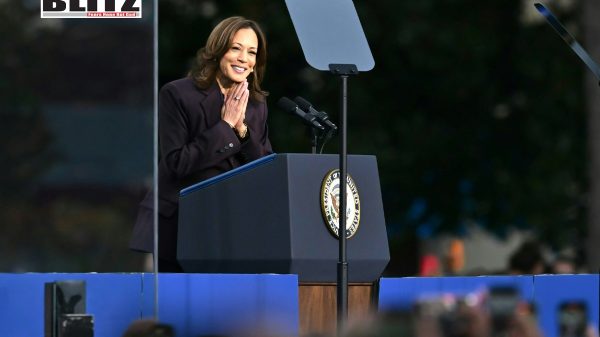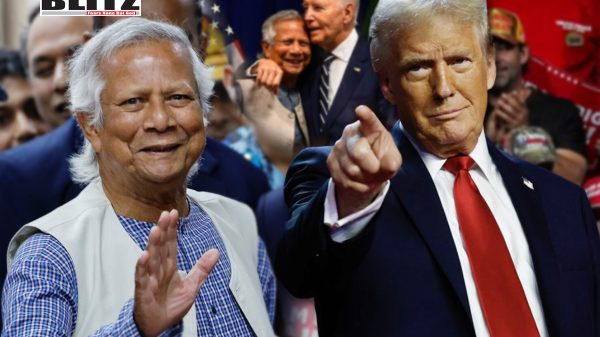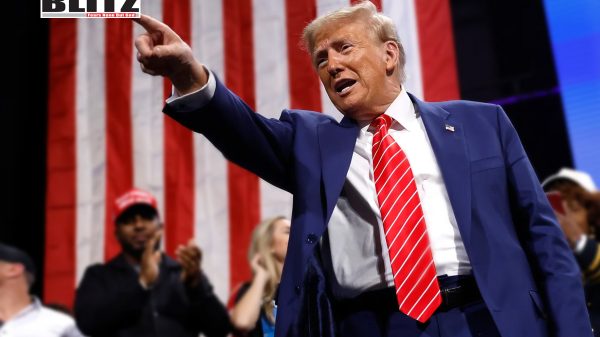Kamala Harris concedes defeat and urges supporters to keep fighting
- Update Time : Friday, November 8, 2024

In an emotional gathering at Howard University in Washington, DC, Kamala Harris delivered her concession speech after her hard-fought campaign came to a disappointing end. Following a long night of anticipation and fluctuating poll results, Harris officially acknowledged her defeat to former President Donald Trump, who secured a decisive Electoral College win and appeared to hold a lead in the popular vote as well.
Before a crowd of loyal and tearful supporters, Harris took to the stage with a speech that was at once somber and defiant. “Good afternoon, good afternoon,” she began, repeating the phrase in a strained voice that hinted at the weight of the moment. Her supporters, many visibly upset and still processing the loss, listened intently as Harris, visibly composed despite the circumstances, prepared them to face the road ahead.
“Now, I know folks are feeling and experiencing a range of emotions right now,” she said, attempting to console the crowd. “I get it. But we must accept the results of the election.” Her words drew audible boos from the audience, who were clearly not ready to accept Trump’s victory. However, they cheered when she mentioned her commitment to a peaceful transfer of power-a reference to the political turmoil that surrounded the 2020 election, highlighting her desire for stability, even in defeat.
In her speech, Harris emphasized the importance of continuing the fight for democratic values, despite the campaign’s loss. “While I concede this election, I do not concede the fight that fueled this campaign,” she proclaimed. Her call to action aimed to refocus her supporters’ energy toward the broader goals of justice and democracy rather than lingering on this one setback. Harris’s message seemed directed as much toward her supporters as to herself, as she encouraged everyone to carry on the cause through civic engagement, legal battles, and acts of kindness. Her words “to treat their fellow Americans with kindness and respect” were especially poignant, as she reminded supporters of the importance of unity in a deeply divided nation.
Harris acknowledged the “dark time” she felt many Americans were facing, but concluded her speech with a powerful if somewhat cryptic metaphor. “If it is, let us fill the sky with the light of a brilliant, brilliant, billion of stars,” she said. This poetic note, though unclear to some, seemed to resonate with the crowd, offering a glimmer of hope in an otherwise bleak moment.
Harris’s husband, Doug Emhoff, stood beside her on stage, visibly emotional and supportive. Her stepdaughter, Ella Emhoff, a model known for her unique style, also shared in the crowd’s anguish, cheering and crying with the audience. Minnesota Governor Tim Walz, Harris’s running mate, appeared devastated, his expression a mix of frustration and disbelief.
Not everyone in Harris’s circle displayed sorrow, however. Her brother-in-law, Tony West, a former lawyer and now an executive in Silicon Valley, was seen smiling, perhaps already looking ahead to new opportunities as the family adjusts to this political chapter’s end. West’s reaction drew speculation about the Harris family’s future, particularly in the corporate world, where they may wield influence outside the political arena.
Even before Harris took to the stage, campaign staffers were already analyzing the reasons behind her unexpected defeat. Frustration simmered within her team, with fingers pointed at President Joe Biden. An anonymous aide was blunt in their criticism: “Joe Biden is the singular reason Kamala Harris and Democrats lost tonight.” This reflection alluded to a longstanding tension within the Democratic Party, with some members feeling that Biden’s presence had limited Harris’s chances of rallying broad support among independents and moderates who were already disillusioned with the current administration.
David Plouffe, a senior adviser to Harris, defended her efforts, noting that she had “dug out of a deep hole” that Biden had, in some way, created. Plouffe’s statement echoed a sentiment that Harris’s staff and advisors had conveyed throughout the campaign: the belief that her chances would have been higher had Biden exited the race earlier, giving her a clearer path to the nomination.
While Harris had publicly supported Biden’s bid for a second term, it seems there was, in hindsight, an underlying belief among her team that she would have benefited from a primary contest. One aide reportedly lamented, “This would have allowed Democrats to hold a contested primary,” adding with confidence that Harris would have won, though such a claim is open to doubt, considering her past struggles in primary contests.
The election result underscored the divisive state of American politics. Harris’s campaign had focused on progressive issues that aimed to inspire younger voters and those on the left. Her platform included climate action, social justice reform, and voting rights, all designed to energize a base frustrated with gridlock in Washington. However, Trump’s resurgence among working-class voters and his ability to mobilize a steadfast base proved insurmountable.
The challenges Harris faced were in some ways emblematic of the broader Democratic struggle: attempting to unite a party that spans the ideological spectrum while simultaneously competing against a resurgent conservative movement. Her defeat at the hands of a former president, especially one as controversial as Trump, will likely prompt Democrats to re-evaluate their strategies moving forward, questioning whether they need to adopt more centrist approaches or continue with progressive policies to secure the support of younger generations.
Harris’s concession was not merely an end to a campaign; it marked the beginning of what she hopes will be an ongoing commitment to the principles she championed. Her encouragement to supporters to “keep fighting” hinted at the possibility of a future in which she remains an influential figure within the Democratic Party, albeit from a different role. The question of how she will continue to shape the party’s direction-either as a politician or through advocacy-will be watched closely in the coming months.
As the dust settles, both Harris’s supporters and the Democratic Party will need to grapple with this outcome. Harris’s path forward, whether in public office, the legal realm, or a return to her roots in community engagement, will be influential in shaping her legacy and potentially redefining Democratic strategies for future elections.
In her final moments on stage, Harris’s voice trembled with determination and hope, as she imparted a final message to her supporters. “To everyone who is watching, do not despair, this is not a time to throw up our hands, this is a time to roll up our sleeves.” Her campaign may have ended, but for her supporters, the fight Harris championed is far from over.














Leave a Reply